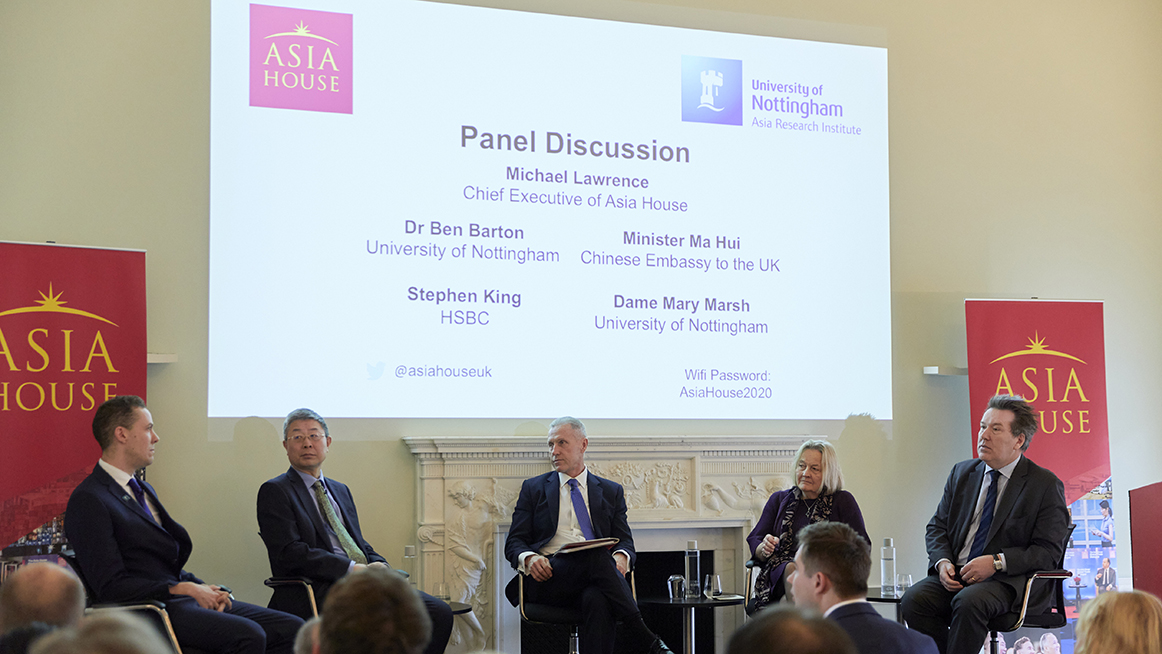Driving commercial and political engagement between Asia, the Middle East and Europe
Driving commercial and political engagement between Asia, the Middle East and Europe
Driving commercial and political engagement between Asia, the Middle East and Europe

The relationships that the UK forges as Brexit progresses will define its future outside of the European Union. As it plots a new course of engagement with the world, it will need to balance an array of competing factors, from geopolitical imperatives to economic necessities. Nowhere will this careful approach be more crucial than in its strategy for engaging with China and, more specifically, the Belt and Road Initiative (BRI).
How the UK should approach the BRI was the central question at an Asia House conference, held in partnership with the University of Nottingham.
Following a speech by Sir Douglas Flint, the UK’s Special Envoy to the BRI, the conference heard insights from a panel of thought leaders from policy, finance and academia.
Stephen King, Senior Economic Adviser at HSBC, argued that trading relationships with both China and the US are important to the UK in a post-Brexit world. However, he feared that geopolitical tensions between the US and China could make “the UK’s trajectory in the future more problematic than it might previously have been.”
However, Dr Ben Barton, Assistant Professor at the University of Nottingham’s Malaysia Campus, pointed to a “desire for engagement” with China from the UK, and a desire to engage with the BRI. There has been a “regeneration of enthusiasm towards the BRI” since Brexit, he said.
The UK could play a role in “helping local decision makers from recipient countries make well informed decisions in terms of projects they really need on the ground,” Barton added, echoing the earlier words of Sir Douglas.
Offering a Chinese perspective, Ma Hui, Minister of the Chinese Embassy in the UK, confirmed that Beijing was looking to cooperate with the UK on “developing the so-called third-party market” for the BRI, as the UK has “traditional relations with so many countries in Asia and Africa.”
When King voiced concerns about debts arising from the BRI that could pose a “threat to the political and economic sovereignty” of these countries, Hui responded by stating that the “so-called debt trap is very much a non-issue”.
“China’s aim is for the recipient country to prosper and it is not our intention to put them into debt,” he said.
The BRI should not be viewed “too much or solely from a geopolitical point of view”, but rather it should be seen as a “comprehensive prosperity plan”, according to the Minister.
Environmental issues were also raised as a potential negative in the BRI, as a question was asked about squaring environmental issues with the demand for fossil fuels around BRI projects.
In response, Hui said: “It is very clear for China that we want to build a so-called green Belt and Road,” adding that China will “implement the strictest environmental standards,” even when bringing hydrocarbon energy sources to developing countries.
“We don’t want to pollute the world”, he said, “while we help other countries develop.”
King proposed the idea that the BRI could aim to “shift from coal directly to renewables and miss out the oil and gas stage to a certain degree”, adding that he wondered whether the “green initiative could be slightly greener” than it currently is.
However, he did acknowledge that the BRI has immense potential, especially in light of the AI and robotics revolution that could reduce the need for low-cost labour from developing nations.
“The BRI does create a possibility for connections to be made that are lasting, which actually create a permanent opportunity for people who would otherwise be impoverished.”
Also on the panel was Dame Mary Marsh, University of Nottingham Asia Advisory Council, who spoke about the potential human impact of such a cooperation.
This type of international connection, she said, has the power “for growing people, developing skills and building much more of a global mindset in populations right along the whole stretch of the Belt and Road.”
Moderated by Asia House Chief Executive Michael Lawrence, the conference offered unique insights into one of the biggest geopolitical and economic decisions facing post-Brexit Britain.
WATCH the session in full at Asia House TV
